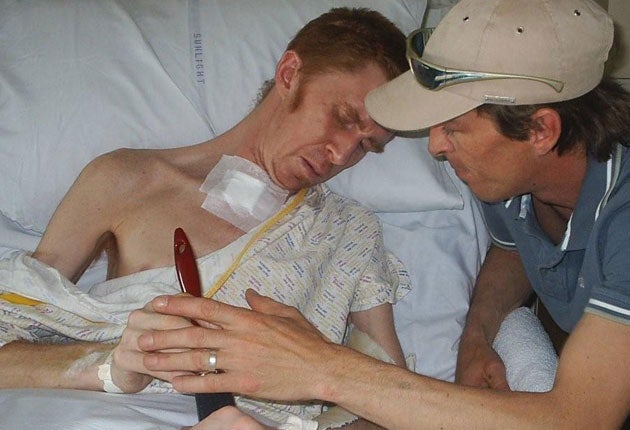Man paralysed after arrest demands a full public inquiry
Gary Reynolds, left in a coma in a police cell, fears the same thing could easily happen to others

Your support helps us to tell the story
From reproductive rights to climate change to Big Tech, The Independent is on the ground when the story is developing. Whether it's investigating the financials of Elon Musk's pro-Trump PAC or producing our latest documentary, 'The A Word', which shines a light on the American women fighting for reproductive rights, we know how important it is to parse out the facts from the messaging.
At such a critical moment in US history, we need reporters on the ground. Your donation allows us to keep sending journalists to speak to both sides of the story.
The Independent is trusted by Americans across the entire political spectrum. And unlike many other quality news outlets, we choose not to lock Americans out of our reporting and analysis with paywalls. We believe quality journalism should be available to everyone, paid for by those who can afford it.
Your support makes all the difference.A man left brain damaged is demanding a public inquiry into "systemic failings" of police and private security staff which almost killed him.
Gary Reynolds, 41, an accomplished marathon runner and self-employed painter and decorator, was found in a coma in his cell a few hours after he was arrested for being drunk and disorderly in Brighton city centre in 2008.
His lawyers believe the Independent Police Complaints Commission (IPCC) failed to investigate properly the circumstances surrounding his arrest and subsequent treatment in the police station, which has resulted in a "deeply flawed report" that "fails to hold those implicated to account".
Mr Reynolds is paralysed on his left side, cognitively impaired and will need full-time care for the rest of his life. No one from Sussex Police or Reliance Security Group, which runs the custody suite, is to lose their job.
Daniel Machover, a partner at Hickman & Rose Solicitors, said: "If he had died, there would be an inquest. If he could remember, he could give his own evidence. But because what happened to him was so serious that he came close to death and doesn't remember anything, we believe these issues must be explored in public in order for the whole truth to come out and lessons to be learnt."
What has been said in court is that in the early hours of Saturday 2 March 2008 Gary Reynolds hailed a taxi after leaving a party seven miles from his home. When he arrived at his destination, he was apparently confused about where he wanted to go, so the taxi driver took him to the city centre. Just after 2.30am, the driver approached police at a nightspot in Brighton, claiming Mr Reynolds was refusing to pay the full fare.
The police arrested him for drunk and disorderly behaviour. It is alleged that Mr Reynolds, while handcuffed, resisted arrest, so was taken to the ground by several officers and a nightclub bouncer. At this point a thud or crack was heard. Two officers checked his head before he was transferred to a police station, but custody officers were not told of a possible head injury. And, despite guidance from the Home Office and IPCC the previous month, no attempts were made to rouse Mr Reynolds; everyone assumed he was drunk and sleeping it off.
The police discovered he was in a coma at 11am and called an ambulance. He woke up after five weeks with a large chunk missing from the right side of his skull, removed by surgeons trying to stem bleeding.
The taxi driver, present at the arrest and the last civilian to see him before police intervened, was interviewed by officers before the IPCC spoke to him. This was a grave error and reflects the IPCC's failure to get hold of the investigation right from the start, Mr Machover said.
No action is recommended against the officers who arrested him. Three station officers have been given advice. But the custody sergeant whose care for Mr Reynolds is described by the IPCC as "perfunctory at best and possibly negligent at worst" will escape discipline because he retired shortly after the event. He now works for Sussex Police in a civil capacity.
Two custody assistants working for Reliance were criticised for their "perfunctory approach", but the IPCC cannot make enforceable recommendations to private companies. One has since been accepted as a trainee officer with Sussex Police. The Crown Prosecution Service has decided not to prosecute anyone.
Speaking from the Royal Hospital for Neuro-disability in London last week, Mr Reynolds said: "I feel so angry at the IPCC; they've let them get away with it, the people who left me for dead in a police cell. I hate to think it could happen to anyone else."
Join our commenting forum
Join thought-provoking conversations, follow other Independent readers and see their replies
Comments